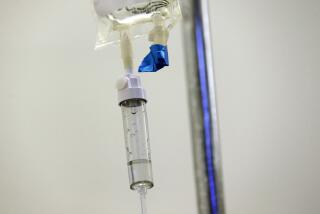Roche to Discuss Licensing Deals to Boost Tamiflu Supply
- Share via
WASHINGTON — Faced with the possibility of a worldwide epidemic of bird flu, the maker of the antiviral medication Tamiflu has agreed to discuss deals with generic pharmaceutical manufacturers that would increase production of the drug, which is in short supply, lawmakers said Thursday.
Tamiflu is not a vaccine, but some doctors believe that if administered early it can reduce the severity of the illness and help prevent its spread.
Sens. Charles E. Schumer (D-N.Y.) and Lindsey Graham (R-S.C.) said Hoffman-La Roche Inc., the U.S. unit of Swiss drug giant Roche, has agreed to enter negotiations with generic manufacturers to increase U.S. production of the drug significantly.
The government has stockpiled enough Tamiflu to treat just over 4 million people. But a massive outbreak of the disease could infect as many as 67 million Americans. And Tamiflu would be a last line of defense, because vaccines for new strains of flu can take months to develop.
“The bottleneck on Tamiflu has basically been broken and there will be production,” Schumer said after he and Graham met with George B. Abercrombie, chief executive of Roche’s North American operations.
Roche has faced increasing pressure in recent weeks to boost production of Tamiflu, or oseltamivir phosphate. Last week Cipla Ltd., an India-based drug maker, said it would market an inexpensive generic version of Tamiflu by early next year without Roche’s permission.
The Capitol Hill meeting came as the Bush administration was trying to finish work on a flu pandemic preparedness plan that could require billions of dollars in new government spending and unprecedented public health efforts on the part of state and local governments. Some Democrats are criticizing the administration for what they see as a lack of attention to the threat and are drawing comparisons to the response to Hurricane Katrina.
The concern about Tamiflu supplies and the possibility of a pandemic arose from the fact that medical experts have been worried that an aggressive strain of flu plaguing birds in Asia and now Europe could mutate in a way that would make it easily transmissible among humans. With no vaccine for the relatively new strain, known as H5N1, the consequences could be dire.
No one can predict when, if ever, a pandemic might break out, though government scientists say it is not likely to happen this flu season.
The senators said Roche had agreed to meet with four major manufacturers of generic drugs and license them to produce Tamiflu, provided that the companies were capable of turning out large quantities of the drug. Roche would receive fees from the companies, and the government would stockpile the medications.
The four firms are Teva Pharmaceutical Industries Ltd. of Israel, Barr Pharmaceuticals Inc. of Woodcliff Lake, N.J., Mylan Laboratories Inc. of Canonsburg, Pa., and Ranbaxy Laboratories of India. Schumer said all had expressed interest in making generic versions of Tamiflu.
New York-traded shares of Roche Holding Ltd., based in Basel, Switzerland, fell 65 cents to $72.25. Teva’s New York-traded shares fell 23 cents to $36.50. Barr fell 36 cents to $56.96 and Mylan rose 16 cents to $20.80. Ranbaxy shares fell 2.1% in Indian trading.
Abercrombie left the meeting without talking to reporters, but he later said in a statement that Roche wanted to do “whatever is needed to prepare for a pandemic.”
He said Roche wanted to be sure that other companies could produce “substantial amounts of Tamiflu for pandemic use in a timely manner in accordance with appropriate quality specifications, safety and regulatory guidelines.”
Even with generic-drug makers pitching in, it could take a year to ramp up U.S. production, said Kim Elliott, deputy director of the Trust for America’s Health, a nonprofit public health organization.
“It’s not something that you can just turn on and Tamiflu pills will start popping out,” she said, noting that dozens of ingredients are involved and the manufacturing process is slow and complicated. Financially, it would be worth the effort only for a company that could make a large quantity of the medication, she said.
Tamiflu has been on the market for several years as a treatment for ordinary flu. Sales of the medication have soared since some lab tests found that it was effective against H5N1. However, other studies have shown that the virus can build up a resistance to the medication.
The federal government has set a goal of stockpiling enough of the drug to treat 20 million people. But Washington moved slowly to order the drug from Roche and now faces worldwide competition for a limited supply.






